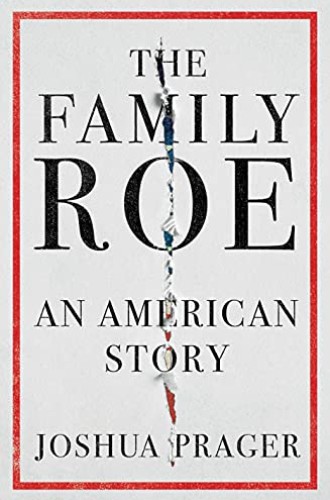In his two decades as a journalist, Joshua Prager has lived among historical secrets. As a Wall Street Journal reporter, Prager identified the Iranian photojournalist who in 1979 won the only anonymous Pulitzer Prize for his coverage of the Iranian Revolution; detailed previously unknown struggles of the family of Raoul Wallenberg, the Swedish diplomat who safeguarded 20,000 Hungarian Jews from his outpost in Budapest before being disappeared by the Soviet government at the end of World War II; and confirmed the long-held rumors that the New York Giants stole opposing pitchers’ signs as they came from behind to win the 1951 National League pennant. In The Family Roe, Prager turns to his most ambitious reporting yet: a book 11 years in the making that introduces vivid color into the black-and-white world of abortion politics.
The “Roe” of the title is Jane Roe, the pseudonym bestowed on Norma McCorvey when she was 22, pregnant with her third daughter, and seeking to obtain an elective abortion, which was then illegal in 48 states including her home state of Texas. McCorvey’s oldest daughter, Melissa, was being raised by her aunt as if her own, and her second daughter had been adopted by a Dallas family. Although McCorvey was convinced to challenge Texas’s abortion laws, she made clear to her attorneys that, in Prager’s words, “she did not want to further a cause; she wanted an abortion.” By the time Roe v. Wade was decided two and a half years later, McCorvey had carried her pregnancy to term, given her daughter up for adoption, and met the woman who became her partner of four decades, Connie Gonzales.
Read our latest issue or browse back issues.
In Prager’s sprawling narrative, we meet Curtis Boyd, an ob-gyn from Tyler, Texas, who began participating in a clandestine abortion referral network in the late 1960s through his Unitarian church. We meet Mildred Fay Jefferson, the first Black female graduate of Harvard Medical School and a prominent antiabortion activist. We meet McCorvey’s attorneys, Sarah Weddington and Linda Coffee, Weddington the daughter of a Methodist minister and Coffee a Southern Baptist who said shortly after Roe was decided that she “would have little personal sympathy for a woman who used abortion at any stage as contraception or to avoid personal responsibility.”
In some of the most moving parts of the book, we meet McCorvey’s three daughters, whom Prager helps bring together to meet in person for the first time. When the three half sisters meet as adults in March 2013, they venture out from the oldest sister’s home to a nearby playground and begin playing on the swing set. McCorvey once told Parade magazine that when she saw children on a playground, “I can’t help wondering if maybe one of them isn’t the one I gave away.”
McCorvey lived a life full of hard jobs. “She had been a waitress and drug dealer, prostitute and painter, respiratory therapist and bond-runner—paid five dollars an hour to retrieve prisoners whose bail was posted”—before cycling through jobs at abortion clinics in Texas, Prager writes. But her hardest job was being Jane Roe. She began taking part in pro-abortion rights activism in the late 1980s, although she soon felt rebuffed by members of a movement among whom, Prager writes, “she was little more than a prop.”
After becoming friendly with antiabortion protesters who set up their office next to the abortion clinic where she worked, McCorvey had an evangelical conversion experience and joined the antiabortion cause. (She would convert again in 1998, this time to Catholicism.) After some time on the antiabortion activism circuit, McCorvey again tired of feeling used by others to make money. She ceased activism altogether in the years leading up to her death, at age 69, in 2017.
Despite Prager’s extraordinary reporting, The Family Roe falls short on some fairly basic points of religious literacy. Some are merely distracting or head-scratching, as when Prager refers to the evangelical movement as “the largest religious denomination in the country.”
More troubling is that Prager discusses “Augustine, Saint” and “Augustine of Hippo” as if they were different people meriting separate entries in the book’s index. When discussing St. Augustine, Prager describes “a celibate Christian convert” who posited that “sex was sinful” and that “it was through sex that Adam had transmitted his original sin to all humanity.” In this discussion, Prager cites the constitutional law scholar Geoffrey Stone on the proposition that Augustine “helped shape traditional American views of sexuality.” Needless to say, this is an exceedingly simplistic take on Augustine’s view of original sin and his legacy a millennium and a half on from his death. Prager is more nuanced when it comes to Augustine of Hippo, described as “a Christian theologian in Africa” who posited that “to kill an unformed fetus—‘non formatum puerperium’—could not be called homicide ‘because it cannot yet be called a living soul in that body which lacks sensation.’”
Still, Prager’s narrative contains multitudes. He traces shifting patterns in Southern Baptists’ positions on abortion throughout the 1970s and identifies the religious impulses motivating those on both sides of the issue of abortion, including two ob-gyns who performed late-term abortions: Curtis Boyd, a Unitarian, and George Tiller, a Lutheran who was murdered in his home church in Wichita, Kansas, in 2009. In the end, Prager’s book does important work by recentering the impact of Roe on its plaintiff, whose story has never before been told in its complexity and has been complicated by McCorvey’s own exaggerations. Despite her celebrity as an activist for each side, the explanation McCorvey gave in an interview to the New York Daily News rings most true: “I’m not pro-choice, I’m not pro-life. I’m pro-Norma.”






